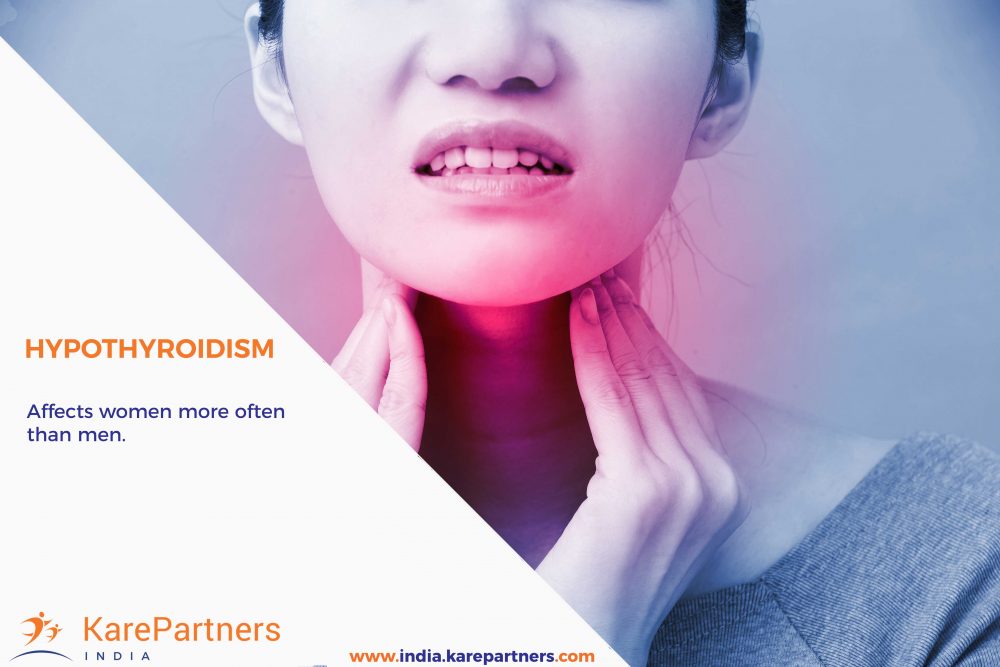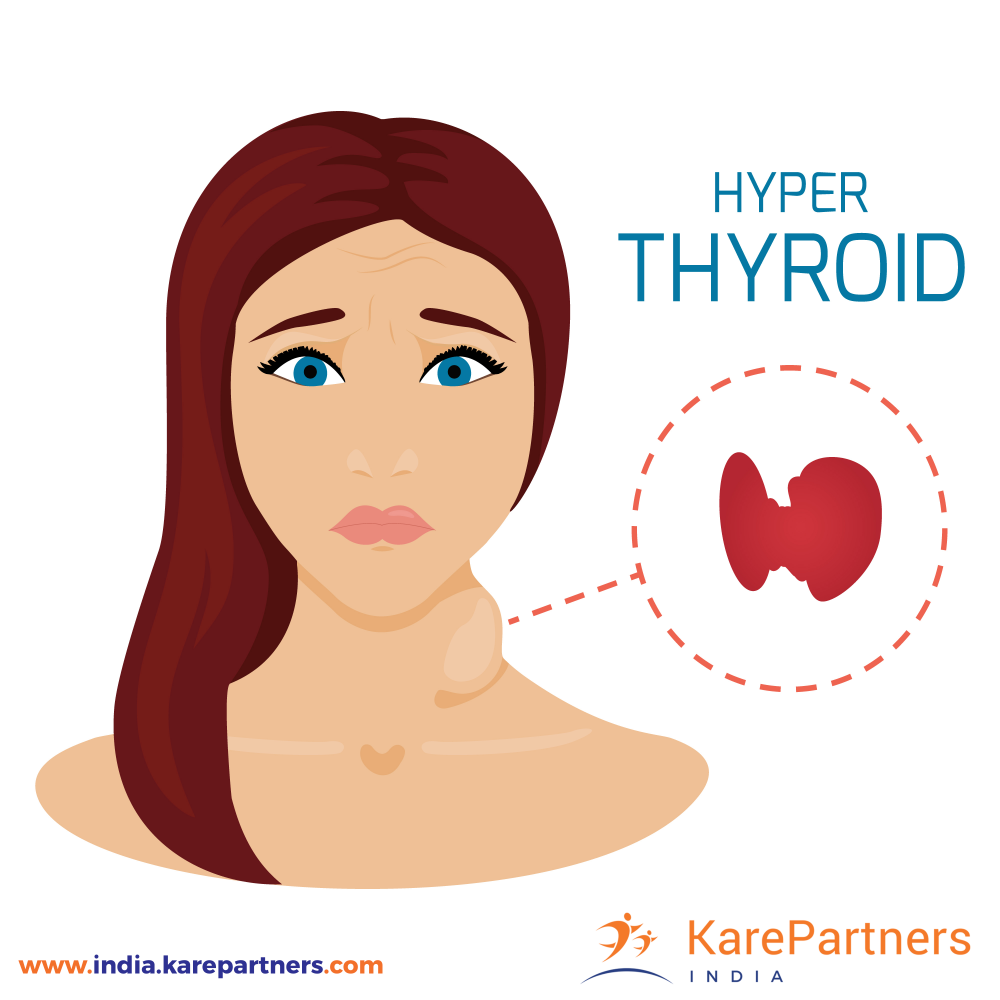WHAT IS HYPOTHYROIDISM AND HOW DOES IT AFFECT ME?
INTRODUCTION
Hypothyroidism is a common disorder and it is also known as an underactive thyroid. In hypothyroidism individual’s thyroid gland does not work properly as it does not make enough thyroid hormone. The thyroid gland is a small butterfly-shaped gland situated in the front lower part of the person’s neck. Hormones released by the thyroid gland move through the bloodstream and almost affect every part of the body, from the heart and the brain to the muscles and the skin.
Thyroid hormone helps to regulate individual’s growth, repair and metabolism. As a result, people suffering from hypothyroidism may experience tiredness, hair loss, weight gain, feeling cold, feel low and many other symptoms. The function of the thyroid is to control body’s cells energy from food, and this process is known as metabolism. Metabolism affects body’s temperature, heartbeat, and how well a person can burn calories. If a person does not have enough thyroid hormone, body processes tend to slow down and the body produces less energy, thus metabolism becomes slow.
When thyroid hormone levels are low, and it gets signal, known as TSH (Thyroid-Stimulating Hormone), thyroid hormones are released into the bloodstream. This signal is directed from the pituitary gland, a small gland found in the base of brain.
Infrequently, the thyroid gland doesn’t release thyroid hormones, even when there is sufficient amount of TSH. This is termed as primary hypothyroidism and is the most common form of hypothyroidism. About 90% of primary hypothyroidism is caused by Hashimoto’s thyroiditis, an autoimmune disorder where the immune system attacks thyroid gland by mistake.
Another reason for primary hypothyroidism is an iodine deficiency, a genetic disorder, taking certain medications and surgery that eliminates a part of the thyroid. Many times the thyroid gland does not receive enough TSH, the signal to discharge more thyroid hormone disrupts. This happens when the pituitary gland does not work properly and is termed as secondary hypothyroidism.
CAUSES OF HYPOTHYROIDISM
Hashimoto’s thyroiditis is the most common cause of hypothyroidism . “. Hashimoto’s Thyroiditis” is an autoimmune disorder which occurs due to an inflammation of the thyroid gland. Individuals with Hashimoto’s produce antibodies that destroy the gland. Thyroiditis can occur due to viral infection.
Other causes of hypothyroidism are:
1.Radiation therapy given to the neck area.
Cancers such as lymphoma requires radiation therapy to the neck area, this further causes various difficulties in producing thyroid hormone.
2.Radioactive iodine treatment.
People with overactive thyroid gland (hypothyroidism) are prescribed with this treatment. Radiations have the tendency to destroy cells present in thyroid gland which can cause hypothyroidism.
3.Certain medications.
Medications used in the treatment of heart problems, cancer etc. can affect thyroid hormone production. Examples- amiodarone (Cordarone, Pacerone), lithium, interferon alpha, and interleukin-2.
4.Less iodine in the diet.
Iodine is essential for the production of thyroid hormone. Body does not make iodine so it should be included in the diet. Salts rich in iodine should be included. Other good sources of iodine are:-fish, eggs, dairy products etc.
5.Pregnancy
Reason for it is not specified but thyroid gland inflammation can occur after pregnancy. This is known as postpartum thyroiditis. Women with this condition have the severe increase in thyroid hormone levels and after that drop in production of thyroid hormone can occur.
6.Pituitary gland damage or disorder.
This occurs very rarely that pituitary gland may interfere with thyroid hormone production. The pituitary gland is responsible for making TSH which depicts the level of thyroid hormone production.
7.Disorder of the hypothalamus.
The very rare form of hypothyroidism can occur if hypothalamus does not produce sufficient amount of hormone called TRH. TSH release is affected by TRH from the pituitary gland. Primary hypothyroidism occurs due to the thyroid gland only. Secondary hypothyroidism occurs due to some other problem interfering with the thyroid gland.
SYMPTOMS OF HYPOTHYROIDISM
Effects of hypothyroidism vary from case to case and its degree of progression. Few symptoms are:-HOW DOES IT AFFECT THE QUALITY OF LIFE
It is very important to get treated with any kind of thyroid disorder. There is a need to consult the doctor as it can interfere with the quality of life. In hypothyroidism, lifestyle changes are very important in order to lead a healthy life. One should emphasize on weight management. Proper nutrition and diet should be followed. In the case of hypothyroidism, it’s very important to completely alter your habits and adopt a healthy routine to control the illness, especially weight gain.
Hyperthyroidism necessitates a special diet from a nutritionist which restricts iodine intake, which is used by the thyroid gland to produce hormones. Thyroid specialists advise that there is no concrete way to avert either type of thyroid disorder. However, they aver that a balanced diet, exercise, and healthy habits can be a significant factor in decreasing the risk of thyroid issues in the future. Once the person is diagnosed with thyroid, it’s essential to follow doctor’s recommendations to avert serious alterations in the body.
EFFECTS OF HYPOTHYROIDISM
It can affect all the systems of the body if left untreated.
Nervous system-
It can alter how nerves carry information to and from the brain, spinal cord and person’s body. Because of this, the person can suffer from peripheral neuropathy which can cause numbness, tingling, pain in the body parts which are affected.
Respiratory system
Muscles can become weak and less efficient due to it. As a result, the person may have dyspnea and not be comfortable in breathing while exercising.
Digestive system
Hypothyroidism decelerates the movement of food through stomach and intestines. Decelerated digestion can lead to symptoms like heartburn, constipation, and bloating.
Reproductive system
Women may have irregular, heavy or missed periods due to hypothyroidism, they may also have the problem in conceiving and may also have a possibility of miscarriage.
HYPOTHYROIDISM TREATMENT
Normal treatment for hypothyroidism includes daily use of the synthetic thyroid hormone such as levothyroxine (Levothroid, Synthroid, others). This oral medication reinstates sufficient hormone levels, retreating the signs and symptoms of hypothyroidism.
After One to two weeks of treatment individual will have less fatigue and will further control the cholesterol levels that were elevated due to the thyroid problem and it can also help in reversing the weight gain. Treatment with levothyroxine is usually long-term or lifelong, but the dosage may need to be adjusted with time.
Alternative medicine
Although many doctors recommend synthetic thyroxine, natural extracts containing thyroid hormone can be derived from the thyroid glands of pigs that are accessible. This produce contains both thyroxine and triiodothyronine. Synthetic thyroid medicines contain thyroxine only and the triiodothyronine. Extracts are accessible by prescription only and shouldn’t be tangled with the glandular concentrates sold in natural food stores. These products aren’t controlled by the Food and Drug Administration, and their effectiveness and purity isn’t guaranteed.
DIETARY ADVICE
People with hypothyroidism should avoid millet, processed foods and supplements like selenium and zinc (unless recommended by their doctor). Foods that comprise gluten and goitrogens are fine in moderate amounts unless they cause discomfort. People with hypothyroidism should have sufficient options for a healthy diet. They can eat eggs, meats, fish, most fruit and vegetables, gluten-free grains and seeds, dairy and non-caffeinated beverages.
CONCLUSION
It’s easy to increase weight with hypothyroidism, there are many things an individual can do to help maintain a healthy weight. For example, one can try to get an adequate amount of rest, have a good amount of protein and rehearse mindful eating. On the other hand, eating gluten may become a reason for uncomfortable symptoms in some people with Hashimoto’s thyroiditis, the chief cause of hypothyroidism. That’s because Hashimoto’s thyroiditis and celiac disease are closely associated. Some people may have both illnesses. Following a thyroid-friendly diet can help decrease your symptoms and help you uphold a healthy weight. It inspires eating whole, unprocessed foods and lean protein. If you want to know the other side of the thyroid which is HYPERTHYROIDISM click on it for all details

